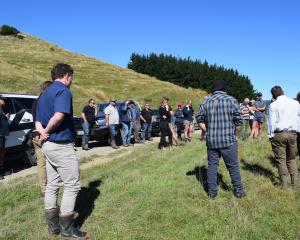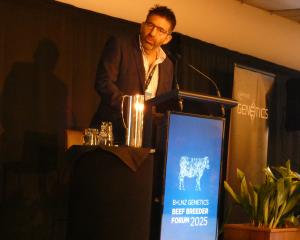
Mr McIvor spoke to more than 80 people in a woolshed at a field day at Matakanui Station.
Sheep farming was a "pretty damn challenging place to be at the moment".
The best financial year for the sheep and beef sector in the past 40 years was 2021-22.
In comparison, this year was shaping up to be the worst financial year for sheep and beef farmers in the past 15 years, he said.
A challenge for the industry was remaining profitable and competing with other industries for land use.
Another challenge was China "struggling to shake itself out of its post-Covid malaise".
A quarter of the people aged between 16 and 23 in China were unemployed.
"They were the rising middle class that were hooking in to red meat."
Competition to supply red meat to China was strong, including from South America and Australia.
Australia had been "building its animal infantry" for the past four years.
Dry conditions were beginning to bite in Australia, so more sheepmeat was being processed to export to China, Europe and North America.
Australia now had a free-trade agreement allowing access for its sheepmeat to enter the United Kingdom,
New Zealand beef would have no tariffs or quotas to export to the UK in 15 years.
Demand for New Zealand red meat was strong in North America.
The US was a unique market, as it was increasing its consumption of sheepmeat and beef, bucking a trend of the rest of the developed world reducing its meat consumption.
People were buying less red meat in Europe due to a tough economic climate.
He believed Europe had reached the bottom of the economic downturn and demand for New Zealand red meat, particularly sheepmeat, was beginning to turn.
An ongoing challenge was a campaign targeting British and European shoppers to prioritise buying local since the withdrawal of the UK from the European Union.
"That has made it hard for us to access some product in there," Mr McIvor said.
To address supply concerns during the Covid pandemic, many international markets overstocked with red meat.
"They are working their way through the inventory before they can start to drive demand again."
After the New Zealand-EU free-trade agreement was signed later this year, 77% of markets would be covered by free-trade agreements.
The new government was more receptive to farmers than the previous one but had provided "a lot of warm words and promises but with little actual change on the ground" as regional councils "crack on" progressing new regulations.
Any new regulatory framework needed to give farmers the confidence to make long-term investments in their business.
Farm plans should be voluntary rather than compulsory, he said.
Farmers should be recognised for the sequestration on their properties.
Beef + Lamb believed there was no justification for taxing farmers around climate change.
"The targets are not right at the moment and they are not science based."













